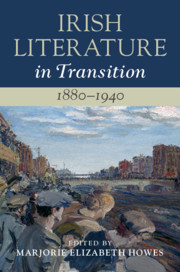Book contents
- Irish Literature in Transition, 1880–1940
- Irish Literature In Transition
- Irish Literature in Transition, 1880–1940
- Copyright page
- Contents
- Contributors
- Series Preface
- General Acknowledgements
- Chapter 1 Introduction
- Part I Revisionary Foundations
- Part II Revolutionary Forms
- Part III Major Figures in Transition
- Chapter 10 Ageing Yeats: From Fascism to Disability
- Chapter 11 ‘I myself delight in Miss Edgeworth’s novels’: Gender, Power and the Domestic in Lady Gregory’s Work
- Chapter 12 Synge and Disappearing Ireland
- Chapter 13 Drumcondra Modernism: Joyce’s Suburban Aesthetic
- Chapter 14 London Irish: Wilde, Shaw and Yeats
- Part IV Aftermaths and Outcomes
- Part V Frameworks in Transition
- Index
Chapter 13 - Drumcondra Modernism: Joyce’s Suburban Aesthetic
from Part III - Major Figures in Transition
Published online by Cambridge University Press: 28 February 2020
- Irish Literature in Transition, 1880–1940
- Irish Literature In Transition
- Irish Literature in Transition, 1880–1940
- Copyright page
- Contents
- Contributors
- Series Preface
- General Acknowledgements
- Chapter 1 Introduction
- Part I Revisionary Foundations
- Part II Revolutionary Forms
- Part III Major Figures in Transition
- Chapter 10 Ageing Yeats: From Fascism to Disability
- Chapter 11 ‘I myself delight in Miss Edgeworth’s novels’: Gender, Power and the Domestic in Lady Gregory’s Work
- Chapter 12 Synge and Disappearing Ireland
- Chapter 13 Drumcondra Modernism: Joyce’s Suburban Aesthetic
- Chapter 14 London Irish: Wilde, Shaw and Yeats
- Part IV Aftermaths and Outcomes
- Part V Frameworks in Transition
- Index
Summary
Let’s begin with a new idea: in truth, the place most obsessively attended to in James Joyce’s writing is not Dublin. Until now, it has been a critical truism that Joyce’s artistic agenda was in part to put Dublin, a backwater that had once, as he noted, been the second city of the British Empire, on the global artistic map. Joyce himself, in naming his story collection Dubliners, and in oft-cited letters to his would-be publisher William Heinemann and to his brother Stanislaus in 1905, spoke of ‘stories of public life in Dublin.
- Type
- Chapter
- Information
- Irish Literature in Transition, 1880–1940 , pp. 229 - 245Publisher: Cambridge University PressPrint publication year: 2020

